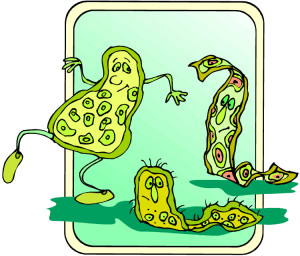 Because it is flu season and we have not only seasonal flu to worry about, but Swine Flu, as well, I wanted to take a moment to discuss MRSA ( Methicillin-Resisitant Staphylococcus aureus ), an infection that is becoming more predominant in our country.
Because it is flu season and we have not only seasonal flu to worry about, but Swine Flu, as well, I wanted to take a moment to discuss MRSA ( Methicillin-Resisitant Staphylococcus aureus ), an infection that is becoming more predominant in our country.
First of all, let’s talk about plain staphylococcus aureus ( generally known as staph aureus) which is a common germ found on the skin or nose of about 1 in every 3 people. It usually doesn’t cause any problems in people who have it on their skin, but it can become a serious infection when it gets into a wound, the blood or causes pneumonia. Antibiotics can be given to treat this kind of infection.
SOME staph infections are resistant to antibiotics though, meaning that they cannot be killed by the antibiotic, and MRSA is one of those, making it difficult to treat.
It is not an illness,in and of itself, it’s a germ, but it can CAUSE illnesses that are stubborn to treat. Sometimes it may simply appear as a sore on the skin
In the hospital, people who are admitted with this infection are placed into what we call “contact isolation” meaning that they have their own room and that doctors, nurses and other health care professionals will use gloves and wear a protective gown when working with them.
Sometimes people can get MRSA from being in a hospital or nursing home from unsuspected carriers of this bacteria. It can be passed on to bed linens, bed rails, bathroom fixtures and medical equipment and of course, hands. Those who are more likely to get it are those who have been in nursing homes, have received antibiotics frequently or who have other health conditions, so that places our elders at a higher risk.
If you or your care recipient is admitted to the hospital, be sure that your health care providers are washing their hands or using alcohol-based sanitizers before and after touching you or equipment in your room. You should also wash your hands frequently yourself, especially after walking about the hospital or nursing home.
People who are healthy and have not been hospitalized can also get MRSA but it is less likely.
Can MRSA infections be treated? Yes, there are antibiotics which are stronger and can kill MRSA germs. But sometimes, even after a person is treated, they can still be a carrier and you may find that these people will be placed in isolation when re-admitted to the hospital for any reason.
Can friends and family still come to visit a person who carries MRSA? Yes, the chances of a visitor getting it is very very low.
If you are a caregiver for a person who contracts MRSA or is already a carrier, you should remember to wash your hands often, especially before and after changing any wound dressing or bandage. Avoid sharing any personal items such as towels or toilet seats. Wash and dry all clothing in the warmest temperatures recommended on the labels.
Always be sure to tell any health care provider that your care recipient (or you) has MRSA. This includes home health workers, office staff, therapists or physicians.
Above all, to decrease your chances of contracting or spreading this germ, always remember to ask your health care providers to wash their hands before and after touching you. Do not be worried about doing this – they will often thank you for it.
LEARN TO LOVE YOUR LIFE AGAIN
 Do you feel like you need to hit the REFRESH button on your life? Download our free guide and begin to create your best life yet!
Do you feel like you need to hit the REFRESH button on your life? Download our free guide and begin to create your best life yet!



Elder Abuse awareness is very important in understanding what good elder care is and is not! Including financial abuse!
GET INVOLVED
There are a number of ways you too can help make a difference and get engaged in the fight to build a society that protects the rights of all its members. Here are a few:
1) Help Raise Awareness About Elder Justice
In addition to emailing your friends and family to let them know about this campaign, you can also join the WITNESS email list where we’ll post regular updates about this campaign.
2) Share your story about elder abuse
Join the conversation on the Hub by leaving a comment below or uploading a video about Elder Justice (to upload, join the Hub now – it’s easy and free). Make sure to tag your video “Elder Justice”. You can also add your story to NCOA’s website by clicking here.
3) Stay Informed!
Subscribe to our Video for Change newsletter and join the NCOA network.
And finally, a special word to Bloggers & Vloggers… Help us spread the word – if you blog about the Elder Justice Campaign, please send us an email or a tweet (@witnessorg)… Also, if you want to add a Hub button on your blog, get one here!
This is a great article about MRSA which is getting forgotten with all the discussion about swine flu. Thanks for posting it.
I couldn’t find a contact form so I want to take this opportunity to introduce myself. My name is John Mills and my father suffered from Parkinson’s disease for a decade.
Based on this experience I have created a website called http://www.ecarediary.com to assist caregivers with long term care. It offers tools, information, shopping and community absolutely free. I would be interested in getting your thoughts or discussing the site further if you are interested.
Thank you!
John Mills
jmills@ecarediary.com
http://www.ecarediary.com